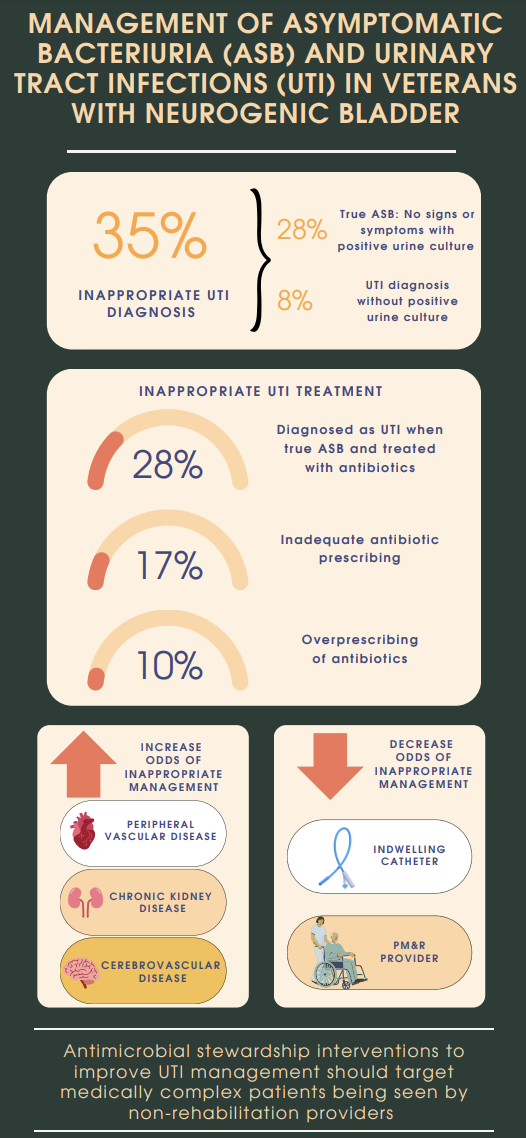Second, people with neurogenic bladder are more likely to experience non-localizing symptoms or unusual manifestations of traditional symptoms, which increases diagnostic uncertainty and contributes to overtreatment of ASB. Third, people with neurogenic bladder have an increased risk of both complications and difficult-to-treat pathogens, which may lead providers to inappropriately treat ASB and UTI.1
We conducted a retrospective cohort study at four VA medical centers including patients with NB and UTI encounters in outpatient, inpatient, and long-term care settings.2 By applying Infectious Diseases Society of America and National Institute for Disability and Rehabilitation Research recommendations for UTI management, we found that over half of encounters had inappropriate diagnosis or treatment, typically from misdiagnosis of ASB as UTI or overly broad-spectrum or too long a duration of antibiotics. Inappropriate diagnosis or treatment was more common for patients with comorbidities such as chronic kidney disease, patients seen by Internal Medicine or Emergency Medicine providers compared to Physical Medicine & Rehabilitation, and patients without catheters. Misdiagnosis of UTI in patients with ASB and overly broad or long duration antibiotics for UTI are common causes of antibiotic overuse, and this study confirms the high frequency of this practice in patients with neurogenic bladder. Antimicrobial stewardship interventions for patients with neurogenic bladder should target key care settings such as Primary Care and the Emergency Department, emphasize thorough symptom assessment to better delineate ASB from UTI, and promote narrower spectrum and shorter duration antibiotics for UTI treatment.

Written by: Margaret A. Fitzpatrick,1 Marissa Wirth,2 Stephen P. Burns,3 Katie J. Suda,4 Frances M. Weaver,5 Eileen Collins,6 Nasia Safdar,7 Charlesnika T. Evans8
- Center of Innovation for Complex Chronic Healthcare, Edward Hines, Jr VA Hospital, Hines, IL; Loyola University Chicago Stritch School of Medicine, Maywood, IL.
- Center of Innovation for Complex Chronic Healthcare, Edward Hines, Jr VA Hospital, Hines, IL.
- Spinal Cord Injury/Disorders Service, VA Puget Sound Healthcare System, Seattle, WA; Department of Physical Medicine and Rehabilitation, University of Washington School of Medicine, Seattle, WA.
- Center for Health Equity Research and Promotion, VA Pittsburgh Healthcare System, Pittsburgh, PA; Department of Medicine, Center for Research on Healthcare, University of Pittsburgh School of Medicine, Pittsburgh, PA.
- Center of Innovation for Complex Chronic Healthcare, Edward Hines, Jr VA Hospital, Hines, IL; Loyola University Chicago Parkinson School of Health Sciences and Public Health, Maywood, IL.
- College of Nursing, University of Illinois Chicago, Chicago, IL.
- Department of Medicine, Division of Infectious Diseases, University of Wisconsin-Madison School of Medicine and Public Health, Madison, WI; William S. Middleton VA Hospital, Madison, WI.
- Center of Innovation for Complex Chronic Healthcare, Edward Hines, Jr VA Hospital, Hines, IL; Center for Health Services and Outcomes Research, Northwestern University Feinberg School of Medicine, Chicago, IL.
- Wirth M, Suda KJ, Burns SP, et al. Retrospective Cohort Study of Patient-Reported Urinary Tract Infection Signs and Symptoms Among Individuals With Neurogenic Bladder. Am J Phys Med Rehabil. 2023;102(8):663-669.
- Fitzpatrick MA, Wirth M, Burns SP, Suda KJ, Weaver FM, Collins E, Safdar N, Evans CT. Management of Asymptomatic Bacteriuria and Urinary Tract Infections in Patients with Neurogenic Bladder and Factors Associated with Inappropriate Diagnosis and Treatment. Archives of Physical Medicine & Rehabilitation. 2023 Oct 10:S0003-9993(23)00585-3.


